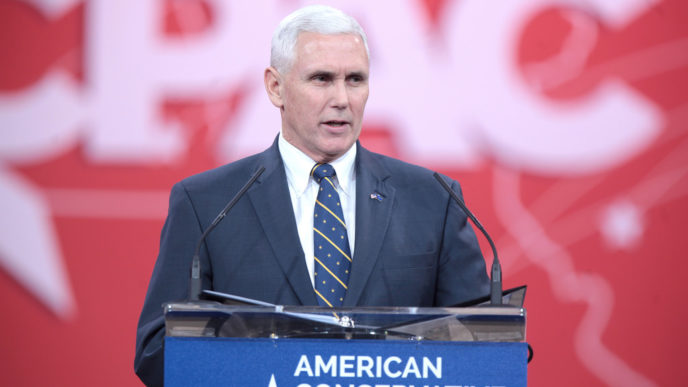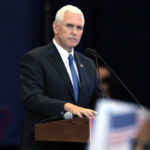Faith, Politics and Mike Pence
GOP vice presidential nominee Mike Pence makes no bones about the role of faith in his life. “I’m a Christian, a conservative and a Republican, in that order,” he is fond of saying.
As Pence takes to the stage Wednesday night in Cleveland, the time is ripe to look closer at the faith walk of the man who may well end up a heartbeat away from the presidency.
Early Years
Mike Pence grew up in a devout Catholic family that, according to the Indy Star, didn’t talk politics at the table. Sundays meant Mass at St. Columba, and like his three brothers, Pence served as an altar boy.
“Our life revolved around the church,” Gregory Pence, one of Mr. Pence’s two older brothers, told The New York Times.
When Pence went off to college at Hanover College in Indiana, he didn’t leave religion behind. Instead, he found fellowship with believers in other branches of the church body.
“I began to meet young men and women who talked about having a personal relationship with Jesus Christ,” he would tell the Christian Broadcasting Network years later. He began seeking a deeper relationship with the Lord.
While attending law school at Indiana University, he spotted a girl playing a guitar in a church choir. Her name was Karen. As The New York Times tells it, “After they started dating, she bought a gold cross with the word ‘Yes’ engraved on it, and kept it stashed away in her purse until he proposed.”
Karen Pence “has been very much a part of his faith journey,” friend Mark Bailey told the Times, “He would refer to his wife as the prayer warrior of the family.”
At a Christian music concert in 1978, Mike Pence gave his life to Christ.
Faith in Action
“I think he will tell you very openly he made a commitment to Christ as a young adult,” the Indy Star quotes law school pal Bill Stephan as saying, “I think he’s pretty serious about his prayer life, and his actions and deeds reflect his faith. That’s part of what motivates him to public service.”
Inspired originally by Dr. Martin Luther King, Jr. and John Kennedy, and later by Ronald Reagan, Pence’s political career has been particularly noted for his stance as a social conservative guided by his evangelical Christian beliefs.
As Indiana governor, Pence signed into law one of the most stringent abortion laws in the U.S., banning abortions when a fetus has a disability. Said Pence, “I sign this legislation with a prayer that God would continue to bless these precious children, mothers and families.” He’s fought to end federal funding to Planned Parenthood.
A strong believer in traditional marriage and religious rights, he championed the Religious Freedom Restoration Act in Indiana, declaring in his 2015 State of the Union address:
I will not support any bill that diminished the religious freedom of Hoosiers or that interferes with the constitutional rights of our citizens to live out their beliefs in worship, service or work. … No one should ever fear persecution because of their deeply held religious beliefs.”
After intense pressure from LGBT activists, businesses and potshots from the President, Pence agreed to amend the act, but continues defending its core principle of religious liberty.
He also cited his faith in his defense of Israel, as the Religious News Service noted, telling AIPAC in 2009, “Let me say emphatically, like the overwhelming majority of my constituents, my Christian faith compels me to cherish the state of Israel.”
When Political Ambition Collided with Christian Conviction
Pence’s faith plays out in the political arena beyond just policies. He never dines alone with a woman who is not his wife, and while in Congress was known for avoiding booze-filled events if Karen was not present. “If there’s alcohol being served and people are being loose,” he told The Hill in 2001, “I want to have the best-looking brunette in the room standing next to me.” As the Times reports, “Fellow representatives sometimes joked about the need to clean up their language when he was approaching them in the halls of Congress.”
Pence had run for Congress before, but his religious convictions got steamrolled by his political ambitions.
In 1988 and 1990, Pence ran against incumbent Democrat Phil Sharp. Both times, Pence went negative. Very negative. A million advertising dollars worth of negative. In one ad, which the IndyStar said had been considered the most negative ad in Indiana history, Pence had an actor dressed as a Sheikh thanking Sharp for the U.S. dependence on foreign oil.
Pence lost both races. But crucially, he came to see his approach as un-Christianlike. “I really screwed up on this,” he told a colleague, “It’s not me.” He would publicly apologize to Sharp and publish an essay in 1991 titled “Confessions of a Negative Campaigner.”
“He vowed he would never run a negative campaign again,” political science professor Brian Vargus said in 2012, “And if you look, he has not.”
“It’s wrong,” Pence said that same year, “to use one’s brief moment in a political debate to talk about what’s wrong with your opponent, as opposed to what’s right with your ideas.”
Already the questions are mounting as to how Pence’s vow will play as he partners with a twice-divorced candidate who shoots out insults like a Gatling gun. Donald Trump, for his part, says he’s not expecting Pence to play the traditional V.P. attack dog roll. “I call her ‘Crooked Hillary’, he told 60 Minutes, “but I don’t think he should do it, because it’s different for him. … He’s not that kind of person.” When asked about it by The New York Times, Pence’s brother Gregory simply said, “Judge not, lest you be judged.”
Pence is expected to bring his irenic, gentlemanly manner to the campaign. “I’m a conservative, but I’m not angry about it,” he says. “Let’s be cheerful partisans and happy warriors.”
His faith is expected to be front and center as he seeks the second highest office in the land. And he can expect comments like this once uttered by a political columnist in Indiana and quoted by the Times, “Pence doesn’t simply wear his faith on his sleeve, he wears the entire Jesus jersey.”
But he can also be expected to express how crucial traditional values are the governance of our nation. As he told the Family Research Council’s Value Voters Summit in 2010, “Those who would have us ignore the battle being fought over life, marriage and religious liberty have forgotten the lessons of history. America’s darkest moments have come when economic arguments trumped moral principles.” (For more from the author of “Faith, Politics and Mike Pence” please click HERE)
Follow Joe Miller on Twitter HERE and Facebook HERE.










